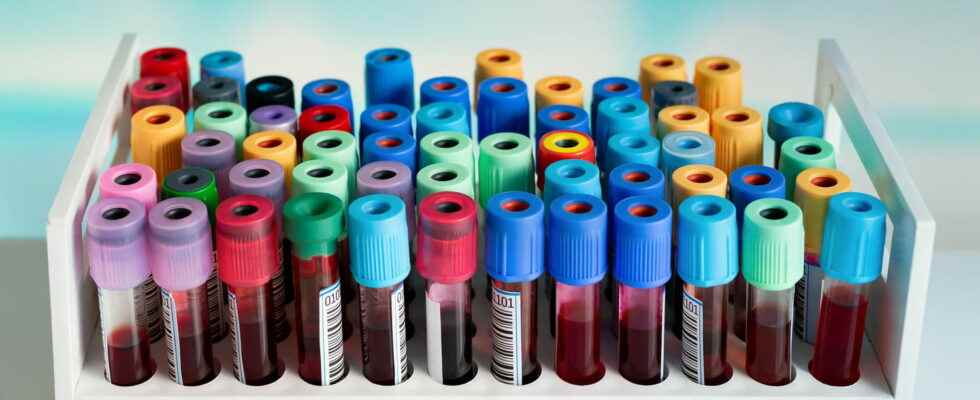Albumin is the most important protein in blood. The drop in its level in the blood (albuminemia) can be a marker of malnutrition and anorexia. What symptoms and consequences? What rate in case of pregnancy?
The albumin level in the blood Where “serum albumin” can be monitored by a blood test. It will reveal if the rate is normal or if the amount of albumin in the blood is too low or too high. What is albumin? What are the causes and symptoms an abnormal level of albumin in the blood? What rate in case of pregnancy?
Definition: what is albumin in the blood?
“Albumin is the main protein that circulates in the blood.” informs Isabelle Fischer-Deguine, medical biologist. It is also called “serumalbumin” or “serum albumin“.”This protein is synthesized (made by the liver) from amino acids (elementary molecules). The albumin level in the blood is called “albuminemia“.
What does albumin do in the blood?
“Albumin essentially participates in the maintenance of vascular oncotic pressure: it keeps the fluid in the vessels so that it does not go into the interstitial tissues. When there is not enough albumin in the blood, the liquid leaves the vessels to go into the tissues and this results in edema“explains the biologist. “Its second very important role is to be a transport protein. It carries many substances: hormones, amino acids, fatty acids, minerals, vitamins, trace elements. Albumin transports these substances to the target cell. When these molecules bind to albumin they are not active and when released from albumin they become active.“explains the biologist.
The normal rate in adults is 35 to 50g per liter
“Blood albumin testing is very common. This assay can be isolated, albumin being a marker. It can also be associated with protein electrophoresis, which measures the other proteins in addition to albumin. Often, proteins are measured, most of which are albumins, and then electrophoresis is done to measure the different proteins.“says the biologist.
What is the normal level of albumin in the blood?
“The normal albumin level in adults is 35 to 50 g minimum of albumin per litre; there may be up to 60 mg of total protein“says the biologist.
Why is the albumin level high in the blood?
“It is not the elevation of the albumin level that is interesting in the blood, informs Isabelle Fischer. The albumin level is high when there is hemo-concentration, especially in case of dehydration.”
What causes low blood albumin?
“On the other hand, when the albumin level drops, it is very important. We are talking abouthypoalbuminemia when the albumin level is less than 35mg/l, this can drop below 20mg/l and it is then a criterion for hospitalization in a person making anorexia nervosa because it’s dangerous” informs Isabelle Fischer. This albumin level can drop for several reasons. “First of all it can decrease in case of hepatic insufficiency whatever the reason (the drop in this albumin level being late)“explains the biologist. The albumin level also decreases in the event of malnutrition. “The main interest of the albumin assay is to detect and monitor severe chronic malnutrition, in the elderly, or in the context of anorexia nervosa or even in the case of chronic alcoholism. This dosage is widely used in the elderly. It is combined with other markers. The PINI, for example, makes it possible to make a diagnosis of undernutrition and to see if there is a morbid risk. Pre-albumin is also measured because it is a more sensitive marker of malnutrition, she specifies. Decreased albumin level is one of the markers of hospitalization for anorexia nervosa” adds the biologist. “Albumin is also a marker of inflammation: when there is inflammation the amino acids are diverted to fight the inflammation. Albumin levels may decrease less commonly with digestive leaks and slightly when taking certain medications such as estrogen. Finally, in micronutrition, the dosage of albumin is interesting because it is an antioxidant“.
What is the difference with albumin in urine?
“There should be no albumin in the urine. Urine albuminuria is a sign of kidney damage. ” informs the biologist. And albumin and micro-albumin in urine should not be confused. “Micro-albumin is sought in the urine in the event of diabetes because it makes it possible to monitor whether there are no renal complications” says the specialist.
What impact on the albumin level during pregnancy?
The level of albumin in the blood of pregnant women decreases in a physiological (normal) way due to estrogen and hemodilution. Albumin is monitored in the urine during pregnancy. “Proteinuria is carried out, of which albumin is a part, because it is a parameter for monitoring pregnancy toxemia. This exam, proteinuria, is performed almost every month of pregnancy“explains Isabelle Fischer.
What treatments for an abnormal level of albumin in the blood?
Albumin is the marker of a pathology. “You have to go beyond when the rate is reduced“, informs Isabelle Fischer. The treatment therefore depends on the cause. “We go treat pathology : liver failure, malnutrition, inflammation. In case of malnutrition, parenteral nutrition may be decided. When the albumin level is coupled with other markers of inflammation, the cause of the inflammation is sought to be corrected” she describes.
Thanks to Isabelle Fischer-Deguine, medical biologist at the Eurofins Bioffice analysis laboratory in Bordeaux and soon to be holder of a DU in micro-nutrition.
